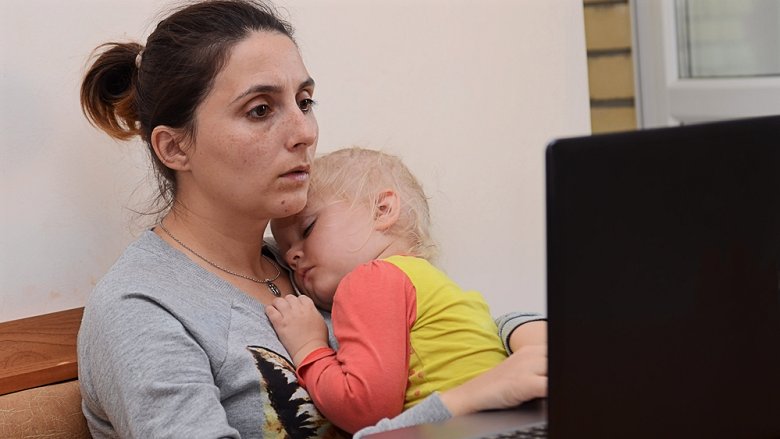In the absence of a nearby kindergarten, Marigona, a woman in her early 40s from a remote village near the town of Vushtrri in Kosovo, struggles every day to find childcare for her 5-year-old son, so she can travel to the capital, Pristina, about 30 kilometers (about 18.64 mi) away, to care for an elderly person. Her husband also travels every morning to Pristina for work.
“The nearest school told us they can’t organize pre-school care since there was no allocated budget as there were only a few children whose families approached the school for enrollment,” says Marigona. Sometimes she asks a relative and sometimes a neighbor to babysit until she returns home in the late afternoon.
The lack of public transport for the hour-long journey to Pristina and then another hour back to her village is also a challenge. Together with a few people from her village, she shares an organized van ride to and from Pristina. Private transport is rare and more expensive.
Marigona is among the minority of women who are employed in Kosovo. According to data from the Kosovo Agency of Statistics only around 20 percent of women in Kosovo participate in the labor force, which is one of the lowest rates in the world.
She attributes women’s unemployment to lack of financial support for entrepreneurship, lack of information on available opportunities, lack of education, and community traditions in the rural areas of Kosovo which force many women to stay at home to provide care for children and elderly and cook meals for the broader family.
In a recent World Bank study, Women, Business, and the Law 2023, which is structured around the life cycle of working women in 190 economies, Kosovo scored 91.9 out of 100, a score higher than the regional average observed across Eastern Europe and Central Asia (84.4). When it comes to constraints on freedom of movement, laws affecting women's decisions to work, laws affecting women's pay, constraints related to marriage, constraints on women starting and running a business, and gender differences in property and inheritance, Kosovo gets a perfect score. However, when it comes to laws affecting women’s work after having children, and laws affecting the size of a woman’s pension, Kosovo could consider reforms to improve legal equality for women.
“Kosovo performs well on legislation relevant for women’s employment and entrepreneurship opportunities, however there is still a gap between the overall legal and regulatory framework, and its impact in practice on the creation of economic opportunities for women”, says World Bank Country Manager, Massimiliano Paolucci. “On the other hand, without the contribution of women to economic growth it will be impossible to create a more prosperous Kosovo”, he added, explaining this development challenge for Kosovo.
The ability to look for work depends also on an environment that allows for the sharing of caretaking responsibilities, which overwhelmingly burden women. Traditional social norms in Kosovo assign family responsibilities almost exclusively to women, and access to high quality, affordable child and elder care is limited, particularly outside the capital and in rural areas.
Despite improvements among younger cohorts, women in Kosovo still present lower levels of education than men. Some 50% of working-age women have lower-secondary education or below. Employment rate among lower educated are low, 30% among men and 5% among women. Women are also more likely to lack work experience than men: 70% of women in the age group 25-29 are not in employment, education, or training.
To tackle these challenges, countries usually use a mix of policies, incentives, and programs directly targeted to women. In Kosovo, further policy dialogue is needed to determine which policies are the best engine for this change.
Child and elder care services need to be made more widely available. Women’s education should be improved to increase their likelihood to work and the quality of their employment. The country can intervene with supportive policies right after or even before graduation to open opportunities to gain experience. Health and social benefits could be reformed to better help reduce vulnerabilities for women in case of illness or job loss. Also, access to finance and other incentives for women entrepreneurs could be made more widely available and easier to access.


